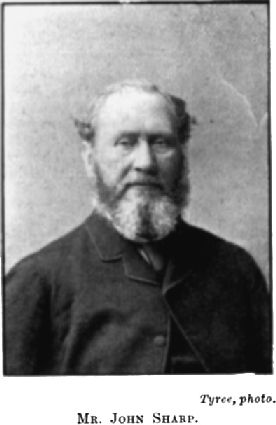John Sharp (New Zealand politician) facts for kids
John Sharp (born 1828 – died 4 June 1919) was an important person in Nelson, New Zealand. He was a Member of Parliament and also the Mayor of Nelson in the late 1800s.
Contents
Early Life and Education
John Sharp was born in Maidstone, England, in 1828. When he was young, he studied for four years at Chatham House College in Ramsgate, preparing to join the Navy. However, he decided to work in the merchant service instead. He was also an honorary member of a group called the Freemasons.
His Work and Businesses
In 1843, John Sharp moved to New Zealand on a ship called the Ursula. He started working as a clerk for a well-known person, Sir Francis Dillon Bell. After that, he became a surveyor for the New Zealand Company, which helped set up new settlements.
Later, he became an assistant clerk and then the main clerk for the Superintendent and Resident Magistrate. He was also appointed as the Registrar of the Supreme Court. After some time, he became the Resident Magistrate (from 1868 to 1871), the Registrar of Deeds, and the Deputy Commissioner of Stamps. He held these important jobs for three years before he retired.
In 1872, John Sharp started a new adventure in business. He became a co-owner of Kent Breweries. A few years later, in 1876, he took control of Nelson's biggest brewery and renamed it The City Brewery. He later sold this business. His second business was an auctioneering company called Sharp and Sons.
Fellworth House
In 1876, John Sharp asked a local builder and architect named John Scotland to build a large, beautiful home for his family. This house was very big, about 620 square metres, and had two stories. It cost 3,000 pounds to build, which was a lot of money back then!
The house, located at 193 Milton Street, was named "Fellworth." This name came from an old family home in England. It was built using strong New Zealand timbers like Rimu, Totara, Matai, and Kauri. The roof was made of English slate tiles, and the main entrance had steps made from African basalt stone.
John Sharp passed away in this house on 4 June 1919. After his death, the house was sold to the Cawthron Trust Board. From 1920 to 1970, Fellworth House was used for different purposes, including labs, a library, and even a museum. Today, it is owned by a private family. Fellworth House is considered a special historic place by Heritage New Zealand. It was officially registered as a Category II historic place on 25 November 1982.
Political Life
John Sharp was very involved in the politics of his time.
Provincial Council
He served as a representative for Waimea East for two years and then for Amuri in the Provincial Council. He also held the important role of Provincial Treasurer for three years.
Parliament
| New Zealand Parliament | ||||
| Years | Term | Electorate | Party | |
| 1875–1879 | 6th | City of Nelson | Independent | |
John Sharp was a Member of Parliament (MP) for the City of Nelson area. He was elected in 1875 and served until 1879, when he resigned. During his time in Parliament, he helped Nelson buy its waterworks and gasworks from the government. These services had been taken over by the government when the provinces were ended.
He tried to get elected again in 1889 but was not successful.
Mayor of Nelson
John Sharp became the Mayor of Nelson in 1887 and served until 1890. He was first elected after the previous mayor, Charles Fell, resigned.
Militia and Community
When a conflict started in the North Island in 1845, the Governor ordered a group of citizens, called the militia, to be formed in places like Nelson. One hundred men were chosen in Nelson and divided into two companies.
John Sharp was one of the men chosen for the militia. He was placed in No 2 Company and was made a Corporal. This was because he had four years of drill training from his college days. The militia even had a band with a fife and drum! They would wake up early at 5:30 AM and practice drills twice a day, from 6 AM to 8 AM and again from 5 PM to 6 PM. This schedule allowed the men to still go to their regular jobs during the day.
The militia later became known as the Nelson Rifles. John Sharp became one of its Captains and later an honorary member. Besides his public service, he was also a volunteer firefighter, a member of the Nelson Bowling Club, and was known as a very good cricketer.
 | James Van Der Zee |
 | Alma Thomas |
 | Ellis Wilson |
 | Margaret Taylor-Burroughs |


